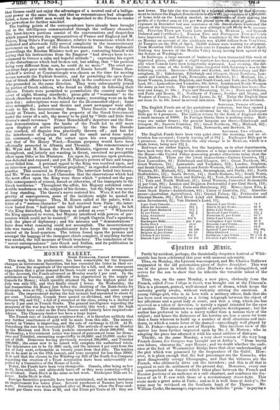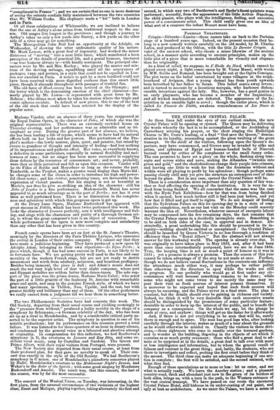f grittrro nuh 311n5ir.
Partly by accident, perhaps, the theatrically-forgotten festival of Whit- suntide has been celebrated this year with unusual solemnity. Thus, on Monday, the Lyceum was reopened, and Mr. Charles Mathews reappeared in the old personation-piece of Before Breahfast. This was one of the pieces in which the elder Mathews was distinguished, and serves for the son to show that he inherits the versatile talent of the father.
Thus, too, on the same Monday, a new piece, obviously from the French, called From Village to Court, was brought out at the Princess's. This is a pleasant, genteel, well-dressed sort of drama, which keeps the curiosity gently awake, without violently stirring the emotions. A young village-girl, who is in love with a military officer, finds that she has been used unconsciously as a living telegraph between the object of her affections and a great lady at court, and that a ring, which she has received as a token of devotion, is merely a signal intended for the eyes of another. This situation was capable a pathetic development ; but the author has preferred to take a merry rather than a serious view of the subject ; and hence the distresses of his heroine are less a cause for tears than a basis whereon to build up a number of droll situations and inci- dents, in which a comic lover of the damsel-exceedingly well played by Mr. D. Fisher-figures as a sort of Marplot. This facetious view of the matter has been further improved upon by Mr. J. M. Morton; who in adapting the piece has adorned it with his usual oddities of dialogue.
Thirdly, on the same Monday, a very short version of the very long French drama Lea Cosagues was brought out at Astley's. " Dum brevis ease laboro, obscurus fib," says Horace; and we doubt whether the audi- ence at the foot of Westminster Bridge have that clear understanding of the plot which was possessed by the frequenters of the Gait& How- ever, it is plain enough that the bad personages are the Cossacks, who most disagreeably occupy Champagne, and that the virtuous are the French, who ultimately drive out the intruders ; and this is all that is required to suit the sentiment of the present day. Moreover, every one can comprehend an emeute which takes place between the French and Russian portions of an audience at a café chantant, and combines the fea- tures of an 0. P. row with those of a revolutionary street-fight. This scene made a great noise at Paris ; and as it is well done at Asdey's, the noise may be reechoed on the Southern bank of the Thames. Mr. William Cooke, the manager, expresses in the billable " pride " in paying a
"compliment to France "and we are certain that no one is more desirous of seeing the entente cordiale fully maintained between the two countries than Mr. William Cooke. His elephants made a "hit" both in London and in Paris.
Of all these celebrations of Whitsuntide' we are inclined to believe that the one at Astley's alone arises from traditional respect to the sea- son. Old usages live longest in the provinces ; and though a journey to .Astley's takes us only a few yards into Surrey, a few yards on the other side of a river may go for something. The Metropolitan John Bull had an opportunity at the Adelphi, on Wednesday, of showing the utter undramatic quality of his nature. Mr. Mark Lemon, with a great deal of ingenuity, had worked the minor distresses of "moving" into a neat little farce, which manifested a keen perception of the details of practical life, and a genial humour, tinctured —as true humour always is—with kindly sentiment. The principal cha- racters were by Mr. and Mrs. Keeley ; who played the master and mis- tress of the moving menage, squabbling amid all the annoyances of packages, vans, and porters, in a style that could not be equalled in Lon- don nor excelled in Paris. A notice to quit by a stern landlord could not have been received with more dignified coolness than this smart little piece, though it abounds throughout with passages of truthful fun.
The old farce of Hush-money has been revived at the Olympic ; and the terror which is the dominating emotion of the chief character—for- merly played by Mr. Liston—is represented with great force by Mr. Robson ; who shines most when he takes his station where the tragic and comic spheres osculate. In default of new pieces, this is one of the best of the old stock that could have been selected for the display of the popular actor.



























 Previous page
Previous page